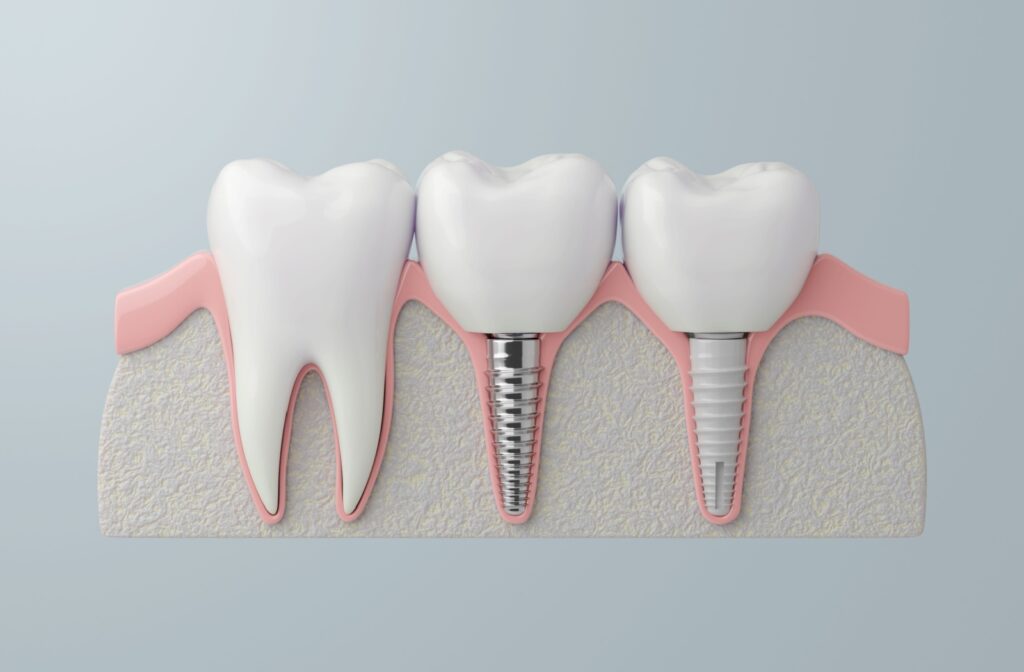Missing or damaged teeth can get in the way of putting on your best smile. Dental implants are a strong, natural-looking replacement that your dental professional can provide to help you refresh your smile. Dental implants are designed to look and feel like natural teeth; with proper care and maintenance, they can yield long-lasting results as well!
The success rate of dental implants depends on your overall health and habits. Dental implants are meant to be permanent, and for most people with good health and oral hygiene habits, they are. However, sometimes, due to chronic illness, smoking, or excessive force, a part of the dental implant can fail and will need further treatment.
Types of Dental Implants & How They Work
Before answering whether dental implants are permanent, we must understand the types available and how each one functions. A traditional dental implant consists of three main parts:
- The Implant Post (Fixture): A titanium screw or post that is surgically inserted into the bone. Titanium is widely used because it is very biocompatible and integrates well with bone.
- The Abutment: A connecting piece that links the implant post to the crown.
- The Crown: The visible prosthetic tooth that is custom-made to blend seamlessly with your natural teeth.
This structure is why dental implants are so effective—they mimic natural teeth’ function, appearance, and feel.
Endosteal Implants
Endosteal implants are the most commonly used type of dental implant. These are surgically inserted into the jawbone and act as artificial roots to support a replacement tooth (crown) or bridge. Over time, the implant fuses with the bone in a process known as osseointegration, creating a strong, stable foundation.
These implants are suitable for patients with healthy, dense jawbone tissue and are renowned for their durability and success rate.
Subperiosteal Implants
Subperiosteal implants are placed beneath the gum tissue but sit on or above the jawbone rather than being drilled into it. This option is typically reserved for patients with insufficient jawbone density who cannot or choose not to undergo bone grafting. While not as common as endosteal implants, subperiosteal implants are effective in specific cases where traditional implants aren’t an option.
What About Mini Dental Implants?
As the name suggests, mini dental implants are smaller in diameter than standard implants. They’re often used for patients with less jawbone density, to secure dentures or to replace small anterior (front) teeth. While mini implants are quicker to install and less invasive, they may not last as long as their full-size counterparts. With proper care, mini dental implants can last 5–10 years.
How Long Do Dental Implants Last?
Dental implants are designed to be a long-term solution and, in many cases, can last a lifetime. However, their longevity depends on several factors, including oral hygiene, lifestyle habits, and overall health. Most crowns placed on dental implants typically last 10 to 15 years before needing replacement, but the implant post often remains intact indefinitely if cared for properly.
Dental implants are as close to permanent as modern dentistry for those looking for a durable, functional, and aesthetically pleasing solution to missing teeth.
How to Help Dental Implants Last Longer
Here are some tips to ensure your dental implants last as long as possible:
- Maintain excellent oral hygiene: Brush twice daily, floss daily, and use an antimicrobial mouthwash. This will keep your implants clean and plaque-free.
- Regular dental checkups: Visit your dentist at least twice a year for professional cleanings and to monitor the health of your implant.
- Avoid harmful habits: Steer clear of smoking, which can hinder healing and weaken the bone, and avoid using your teeth to open packaging or chew complex objects like ice.
- Wear a night guard if needed: If you clench or grind your teeth at night, wearing a Night Guard can protect your dental implants and natural teeth from excessive force.
The Impressive Success Rate of Dental Implants
Dental implants have an exceptional success rate of 95–98%, making them one of the most reliable tooth replacement options. When properly maintained, they provide a highly functional and aesthetically pleasing solution for decades.
What Factors Can Influence Whether a Dental Implant Will Fail?

While dental implants are highly reliable, certain factors can increase the risk of failure, including:
- Poor oral hygiene: Neglecting oral care can lead to infections like peri-implantitis, which may compromise the implant.
- Smoking: Reduces blood flow to the gums and bone, impeding healing and integration.
- Insufficient bone density: Without enough jawbone support, the implant may become loose or fail to integrate properly.
- Chronic health: Conditions such as diabetes or autoimmune diseases can slow healing and increase the risk of complications.
- Excessive force: Bruxism (teeth grinding) or biting objects can place undue stress on the implant.
What Happens if an Implant Fails?
Implant failure is rare, but when it does occur, treatment options become loose due to infection or lack of integration with the bone; it may need to be removed to prevent further damage to the surrounding bone and tissue.
After removing a failed implant, your dentist will evaluate the condition of your jawbone and surrounding tissue. Depending on the situation, options may include:
- Bone grafting: If bone loss has occurred, a graft may be performed to strengthen the area before attempting a new implant.
- Replacement implant: A new implant may be placed after the area has healed completely.
- Alternative treatments: If implants are no longer viable, other restoration options, such as bridges or dentures, can be used.
The key to minimizing the risk of implant failure is to work closely with your dental professional and adhere to recommended care practices.
Your Next Steps Towards a Healthy Smile
Genesis Dental knows dental implants offer a life-changing solution that can restore your confidence, oral health, and quality of life. Contact us today to discuss your unique needs and determine the best dental implant treatment plan.




